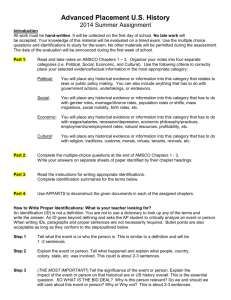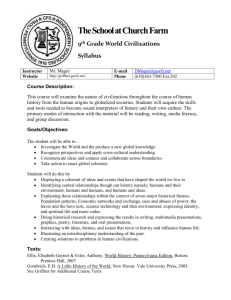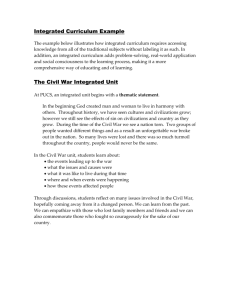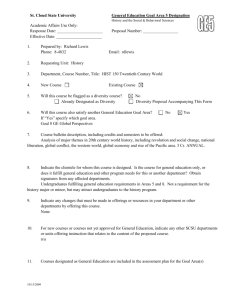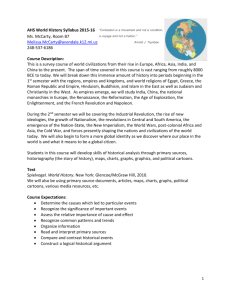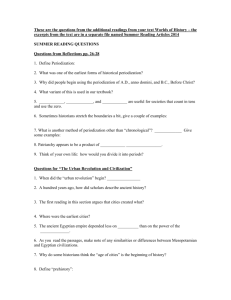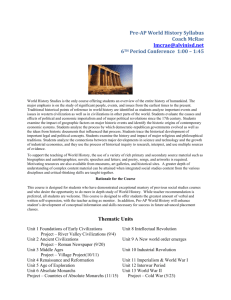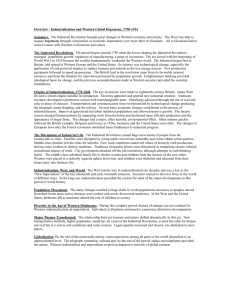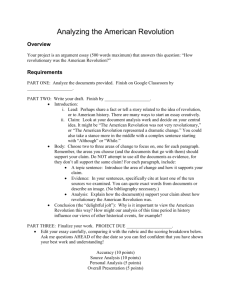AP WORLD HISTORY SYLLABUS PRIMARY TEXT Sterns, Peter N
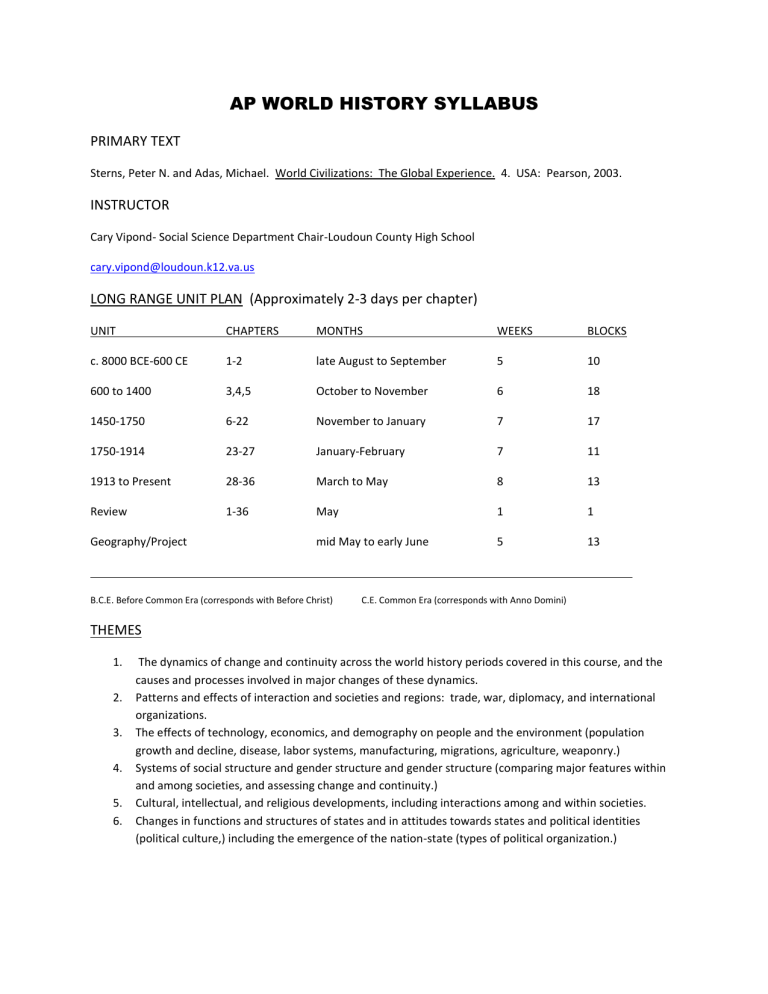
AP WORLD HISTORY SYLLABUS
PRIMARY TEXT
Sterns, Peter N. and Adas, Michael. World Civilizations: The Global Experience. 4. USA: Pearson, 2003.
INSTRUCTOR
Cary Vipond- Social Science Department Chair-Loudoun County High School cary.vipond@loudoun.k12.va.us
LONG RANGE UNIT PLAN (Approximately 2-3 days per chapter)
UNIT c. 8000 BCE-600 CE
600 to 1400
CHAPTERS
1-2
3,4,5
MONTHS late August to September
October to November
WEEKS
5
6
1450-1750
1750-1914
1913 to Present
Review
6-22
23-27
28-36
1-36
November to January
January-February
March to May
May
7
7
8
1
Geography/Project mid May to early June
B.C.E. Before Common Era (corresponds with Before Christ)
5
C.E. Common Era (corresponds with Anno Domini)
THEMES
17
11
13
1
13
BLOCKS
10
18
1.
The dynamics of change and continuity across the world history periods covered in this course, and the causes and processes involved in major changes of these dynamics.
2.
Patterns and effects of interaction and societies and regions: trade, war, diplomacy, and international organizations.
3.
The effects of technology, economics, and demography on people and the environment (population growth and decline, disease, labor systems, manufacturing, migrations, agriculture, weaponry.)
4.
Systems of social structure and gender structure and gender structure (comparing major features within and among societies, and assessing change and continuity.)
5.
Cultural, intellectual, and religious developments, including interactions among and within societies.
6.
Changes in functions and structures of states and in attitudes towards states and political identities
(political culture,) including the emergence of the nation-state (types of political organization.)
UNIT PERIODIZATION
UNIT 1: Foundations: 8000 B.C.E to 600 C.E
Read, take notes, and discuss chapters 1-2 (Neolithic Revolution, Ancient and Classical Civilizations)
Emergence of civilization and the importance of religion
River Valley Civilization comparison essay
Nature and decline of Classical Civilizations
Document analysis (APPARTS)
Legacies of River Valley and Classical civilizations
Unit test (50-70 multiple choice questions with 5 choices)
UNIT 2: 600 to 1450 C.E.
Read, take notes, and discuss chapters 3-5 (Islam, Africa, Asia)
Spread of Islam and impact
Compare political units, trading cities, trade routes, warrior cultures, and arts and sciences
Document analysis (APPARTS)
Comparison essay- political units, trading cities, trade routes, warrior cultures, and arts and sciences
Achievements of Chinese civilizations
Impact of Mongols on China, Russia, Islamic world
Feudal Europe and Feudal Japan
Christendom
Comparison essay- Influence of Mongol rule in China, Russia, Islamic world
Comparison essay- Feudalism
Comparison essay- American civilizations
Unit test (50-70 multiple choice questions with 5 choices)
UNIT 3: 1450 to 1750 C.E.
Read, take notes, and discuss chapters 6-22 (Gunpowder empires-rise of the west, Americas, Asia, Africa)
Renaissance, Reformation, and exploration
Scientific Revolution, Enlightenment, absolutism
Document analysis (APPARTS)
Columbian Exchange, Triangular Trade, and Slavery
Change Over Time Essay- Atlantic Slave Trade 1400-1750
MIDTERM EXAM (All material covered will be tested)
Unit test (50-70 multiple choice questions with 5 choices)
UNIT 4: 1750 to 1914 C.E.
Read, take notes, and discuss chapters 23-27 (Mercantilism, Industrialization, Imperialism, Nationalism, revolution)
Industrial Revolution and its impact
Economic theory (Capitalism and Socialism/Communism)
American Revolution
French Revolution and Napoleon
Latin American Revolutions
Document analysis (APPARTS)
Imperialism and its impact
Comparison essay- China and Japan’s reaction to European Imperialism
SPRING BREAK- AP free response exam at home
Unit test (50-70 multiple choice questions)
UNIT 5: 1914 TO Present
Read, take notes, and discuss chapters 28-36 (World Wars, Cold War, Africa, rise of the rest)
WWI
Russian Revolution
Global Depression
Document analysis (APPARTS)
WWII
Holocaust and Genocide
African/Asian independence movements
Document analysis (APPARTS)
Change Over Time Essay
Cold War (Africa, Asia)
Globalization
Unit test (50-70 multiple choice questions)
RIGOROUS HISTORY COURSE HABITS OF MIND
Constructing and evaluating arguments: using evidence to make plausible arguments.
Using documents and other primary data: developing the skills necessary to analyze point of view, context, and bias, and to understand and interpret information.
Assessing issues of change and continuity over time, including the capacity to deal with questions of causation.
Understanding diversity of interpretations through analysis of context, point of view, and frame of reference.
WORLD HISTORY HABITS OF MIND
Seeing global patterns and processes over time and space while also connecting local developments to global ones and moving through levels of generalizations from the global to the particular.
Comparing within and among societies, including comparing societies’ reactions to global processes.
Being aware of human commonalities and differences while assessing claims of universal standards, and understanding culturally diverse ideas and values in historical context.
THE EXAMINATION
QUESTION TYPE
Multiple Choice
DBQ
COT Essay
Comparative Essay
1
1
# OF QUESTIONS
70
1
TIMING
55 Minutes
60 Minutes
40 Minutes
40 Minutes
% OF EXAM
50%
1/3
1/3 50%
1/3
130 Minutes for the free response portion . You have to time yourself_____
AP WORLD HISTORY COURSE DESCRIPTION GUIDE
The Acorn Book provides the content to be mastered for the multiple choice section as well as the rubrics for the three essays. You may order the Course Description from AP Central or print it out from the website. www.apcentral.collegeboard.com
CLASSROOM EXPECTATIONS
This is a college level class and we will be moving at a quick pace. You are responsible for doing A GREAT DEAL OF
WORK outside of class. Your score on the AP test will in the end, be determined by your efforts.
It is expected that every student arrive to class on time. Each student will have all of the necessary materials that are needed for the day’s assignment (blue-black-red-green pen, pencils, notebook, and text) are required every day. Each student will be expected to remain seated and participate when asked. Disruption, such as inappropriate behavior and language, will not be tolerated in the classroom. I am committed to providing an excellent learning environment in my classroom, and I will discourage interruptions.
GRADING
Your grade in this class reflects the total effort you give to the subject of Advance Placement World History. I feel it is important that you give at least as much effort toward homework assignments, research projects, and oral participation as you do in studying for tests.
Homework- 25%
Tests- 25%
Writing- 25%
Quiz- 25%
Unit exams are given at the end of each unit. They are comprised of 50-70 multiple choice questions with 5 choices (A-E). Students will have one class period to complete the test or roughly 80 minutes. Exams can also come in the form of Essays that are timed just as they would be during the AP exam. The timed essay must also be completed during class. Mid-term and final examinations are given at the end of the first and second semesters. The examinations count 20% of the second semester grade. The grade for the year (final grade) is the average of the first and second semester grade.
LATE WORK
Late assignments will be docked 25 points per day late.
AP REVIEW SESSIONS
Five weeks prior to the AP World History Exam, I will hold morning review sessions focus on the major comparisons and snapshots listed in the Acorn book. Each week focuses on a different unit or periodization.
